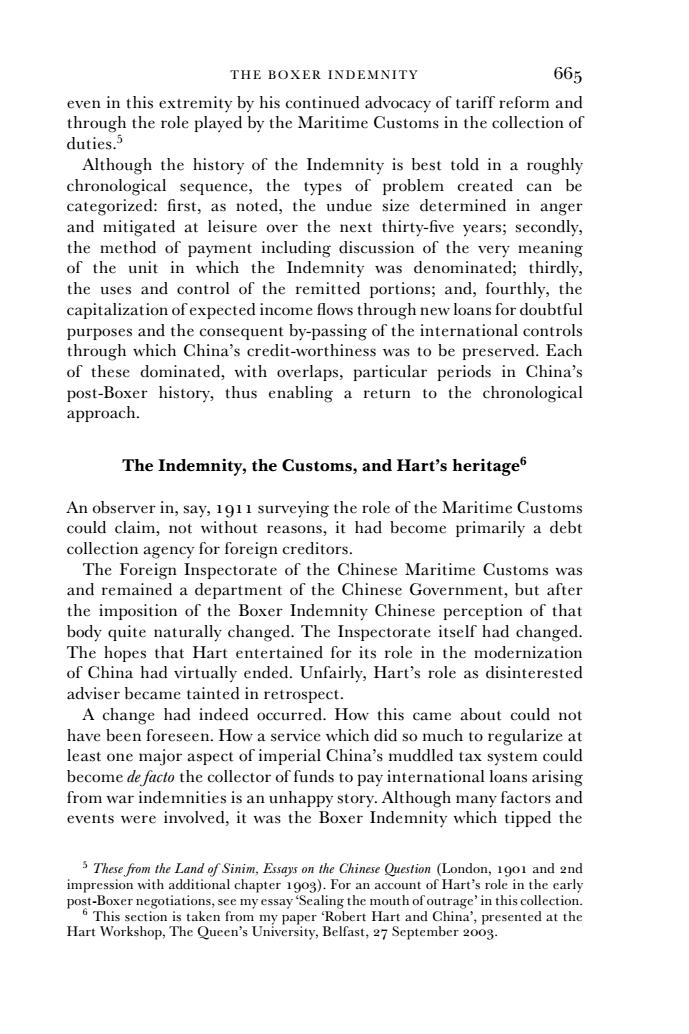正在加载图片...

THE BOXER INDEMNITY 665 even in this extremity by his continued advocacy of tariff reform and through the role played by the Maritime Customs in the collection of duties. Although the history of the Indemnity is best told in a roughly chronological sequence,the types of problem created can be categorized:first,as noted,the undue size determined in anger and mitigated at leisure over the next thirty-five years;secondly, the method of payment including discussion of the very meaning of the unit in which the Indemnity was denominated;thirdly, the uses and control of the remitted portions;and,fourthly,the capitalization of expected income flows through new loans for doubtful purposes and the consequent by-passing of the international controls through which China's credit-worthiness was to be preserved.Each of these dominated,with overlaps,particular periods in China's post-Boxer history,thus enabling a return to the chronological approach. The Indemnity,the Customs,and Hart's heritage6 An observer in,say,1911 surveying the role of the Maritime Customs could claim,not without reasons,it had become primarily a debt collection agency for foreign creditors. The Foreign Inspectorate of the Chinese Maritime Customs was and remained a department of the Chinese Government,but after the imposition of the Boxer Indemnity Chinese perception of that body quite naturally changed.The Inspectorate itself had changed. The hopes that Hart entertained for its role in the modernization of China had virtually ended.Unfairly,Hart's role as disinterested adviser became tainted in retrospect. A change had indeed occurred.How this came about could not have been foreseen.How a service which did so much to regularize at least one major aspect of imperial China's muddled tax system could become de facto the collector of funds to pay international loans arising from war indemnities is an unhappy story.Although many factors and events were involved,it was the Boxer Indemnity which tipped the 5 These from the Land of Sinim,Essays on the Chinese Question (London,and 2nd impression with additional chapter 1gos).For an account of Hart's role in the early post-Boxer negotiations,see my essay Sealing the mouth ofoutrage'in this collection. 6 This section is taken from my paper Robert Hart and China',presented at the Hart Workshop,The Queen's University,Belfast,27 September 2003.THE BOXER INDEMNITY 665 even in this extremity by his continued advocacy of tariff reform and through the role played by the Maritime Customs in the collection of duties.5 Although the history of the Indemnity is best told in a roughly chronological sequence, the types of problem created can be categorized: first, as noted, the undue size determined in anger and mitigated at leisure over the next thirty-five years; secondly, the method of payment including discussion of the very meaning of the unit in which the Indemnity was denominated; thirdly, the uses and control of the remitted portions; and, fourthly, the capitalization of expected income flows through new loans for doubtful purposes and the consequent by-passing of the international controls through which China’s credit-worthiness was to be preserved. Each of these dominated, with overlaps, particular periods in China’s post-Boxer history, thus enabling a return to the chronological approach. The Indemnity, the Customs, and Hart’s heritage6 An observer in, say, 1911 surveying the role of the Maritime Customs could claim, not without reasons, it had become primarily a debt collection agency for foreign creditors. The Foreign Inspectorate of the Chinese Maritime Customs was and remained a department of the Chinese Government, but after the imposition of the Boxer Indemnity Chinese perception of that body quite naturally changed. The Inspectorate itself had changed. The hopes that Hart entertained for its role in the modernization of China had virtually ended. Unfairly, Hart’s role as disinterested adviser became tainted in retrospect. A change had indeed occurred. How this came about could not have been foreseen. How a service which did so much to regularize at least one major aspect of imperial China’s muddled tax system could become de facto the collector of funds to pay international loans arising from war indemnities is an unhappy story. Although many factors and events were involved, it was the Boxer Indemnity which tipped the 5 These from the Land of Sinim, Essays on the Chinese Question (London, 1901 and 2nd impression with additional chapter 1903). For an account of Hart’s role in the early post-Boxer negotiations, see my essay ‘Sealing the mouth of outrage’ in this collection. 6 This section is taken from my paper ‘Robert Hart and China’, presented at the Hart Workshop, The Queen’s University, Belfast, 27 September 2003